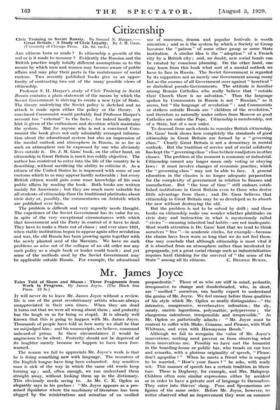Citizenship
ARE citizens born or made ? Is citizenship a growth of the soil or is it made to measure ? Evidently the Russian and the British practice imply totally different assumptions as to the means by which men and women may become aware of public affairs and may play their parts in the maintenance of social custom. Two recently published books give us an oppor- tunity of contrasting two out of the many possible views of citizenship.
Professor S. H. Harper's study of Civic Training in Soviet Russia contains a plain statement of the means by which the Soviet Government is striving to create a new type of State. The theory underlying the Soviet policy is sketched and no attack is made upon either the policy or the theory. A convinced Communist would probably find Professor Harper's account too "external" to the facts ; for indeed hardly any hint is given of the enthusiasm and devotion which maintains the system. But for anyone who is not a convinced Com- munist the book gives not only admirably arranged informa- tion about the- educational system but also an impression of the mental outlook and atmosphere in Russia, in so far as such an atmosphere can be expressed by one who obviously lives outside it. Dr. J. M. Gaus' book, on the other hand, on citizenship in Great Britain is much less coldly objective. The author has contrived to enter into the life of the country he is describing, without sacrificing the ability to criticize it. As a citizen of the United States he is impressed with some of our customs which to us may appear hardly noticeable : but every British citizen would gain some more knowledge of his own public affairs by reading the book. Both books are written mainly for Americans ; but they are much more valuable for all students of citizenship than the traditional platitudes about civic duty or, possibly, the commentaries on Aristotle which are published over here.
The problem is difficult and very urgently needs thought. The experience of the Soviet Government has its value for us, in spite of the very exceptional circumstances with which that Government and the Party in control of it have to deal. They have to make a State out of chaos ; and ever since 1921, when stable institutions began to appear again after revolution and war, the old Russia has been growing again together with the newly planted seed of the Marxists. We have no such problems as arise out of the collapse of an old order nor any such policy as a single book or leader could teach ; and yet some of the methods used by the Soviet Government may be applicable outside Russia. For example, the educational
use of museums, drama and popular festivals is worth attention ; and so is the system by which a Society or Group becomes the " patron " of some other group or some State institution. A similar idea is the " adoption " of a French city by a British city ; and, no doubt, new social bonds can be created by conscious planning. On the other hand, one may learn from this book what sort of a mental outlook we have to face in Russia. The Soviet Government is regarded by its supporters not as merely one Government among many but as the essence of all Government over against " heretical " or diabolical pseudo-Governments. The attitude is familiar among Roman Catholics who really believe that " outside their Church there is no salvation." Thus the language spoken by Communists in Russia is not " Russian," as it seems, but " the language of revolution " : and Communists or strikers outside Russia are " children of the revolution," and therefore as naturally under orders from Moscow as good Catholics are under the Pope. Citizenship is membership, not of a State, but of a new order.
To descend from such clouds to consider British citizenship, Dr. Gaus' book shows how completely the standards of good citizenship in Great Britain are formed by a " governing class." Clearly Great Britain is not a demobfacy in mental outlook. But the tradition of service and of social solidarity has kept the " governing class " close to their coadjutors in other classes. The problem at the moment is economic or industrial. Citizenship cannot any longer mean only voting or obeying laws : it must involve changes of economic practice, which the " governing class " may not be able to face. A general education in the classics is no longer adequate preparation for the complexity of government in relation to finance and manufacture. But " the tone of time " still endears estab- lished institutions in Great Britain even to those who derive little advantage from them ; and Dr. Gaus believes that citizenship in Great Britain may be so developed as to absorb the new without destroying the old.
But the problem is not to be solved by drift ; and these books on citizenship make one wonder whether platitudes on civic duty and instruction in what is mysteriously called " civics "—meaning inherited bad habits—are not inadequate. Most worth attention is Dr. Gaus' hint that we tend to think ourselves " free "—in academic circles, for example—because the chains have been worn so long that we do not feel them. One may conclude that although citizenship is most vital H it is absorbed from an atmosphere rather than inculcated by propaganda, yet a great social change such as industrialization requires hard thinking for the survival of " the sense of the
State " among all its citizens. C. DELISLE BURNS.


































 Previous page
Previous page